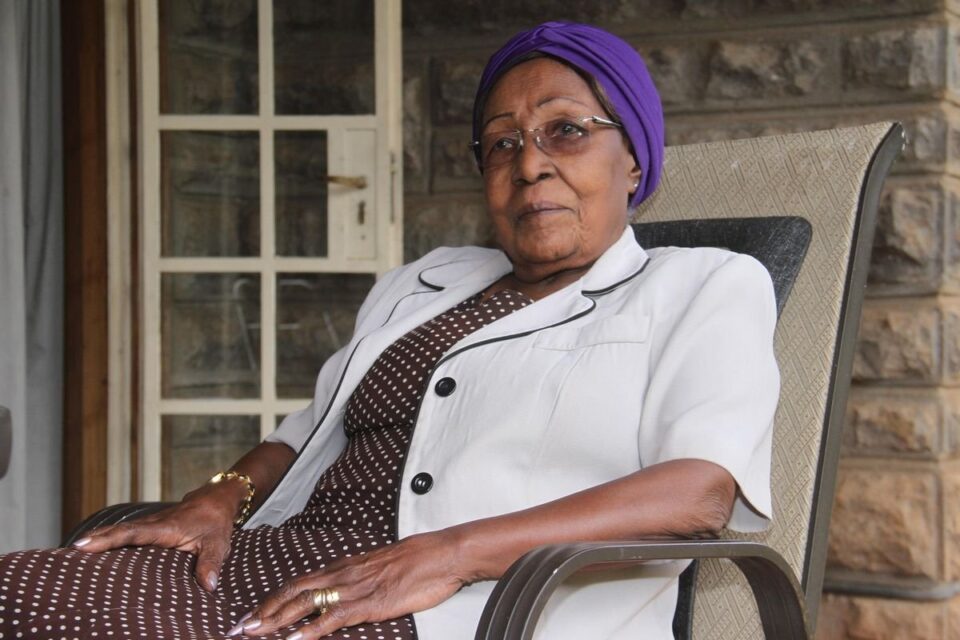President Uhuru Kenyatta’s brother-in-law Udi Mareka Gecaga has again won a court battle to evict his step-mother from a palatial home in Nairobi’s upmarket Muthaiga suburb.
Margaret Gacigi Gecaga lost a bid at the High Court to overturn an order by an arbitration tribunal two years ago allowing her ejection from the house in Old Muthaiga estate in Nairobi.
The tribunal had in August 2018 rejected Ms Gecaga’s assertion that the property was a matrimonial home, which could not be transferred without her knowledge or consent.
Dr Bethuel Mareka Gecaga, who died in 2016, had transferred eight Muthaiga properties, including the house, to his firm, Quinvest Ltd.

Ms Gecaga had petitioned the tribunal to find that the eight properties were matrimonial property.
However, the tribunal stated the properties were purchased in the 1960s and 1970s when Dr Gecaga, one of Kenya’s pioneering indigenous corporate executives, was married to former nominated MP Jemima Gecaga, Udi’s mother, who died in 1979.
It cited Ms Gecaga’s own evidence that she had lived with Dr Gecaga as husband and wife from 1993, separated for two years and then reunited in 2007.
“For one to claim a beneficial interest in matrimonial property, a spouse must have proved contribution towards the acquisition and improvement of the property and that the applicant herein had not adduced any evidence to prove that the Muthaiga properties were jointly owned or that it was acquired during the subsistence of the marriage,” the tribunal ruled on August 8 2018.
It is this verdict that she challenged at the High Court, but lost on August 20, this year, when Justice Grace Nzioka found the application had no merit and dismissed it.
Second victory
It is the second victory for Mr Gecaga, the former chairman of Lonrho East Africa, against his step-mother, who is now staring at a possible eviction.
Udi Gecaga is the ex-husband of President Kenyatta’s elder sister Jeni Wambui.
His son Jomo works at State House as the President’s long-serving personal assistant, and is named after his grandfather Jomo Kenyatta, President Kenyatta’s father and Kenya’s first President.
A daughter, Nana, serves as chief executive of the iconic Kenyatta International Convention Centre, a state corporation.
Ms Gecaga had moved to court in 2011, accusing her step-son of fraudulently transferring to himself the eight properties.
The properties were initially registered in her late husband’s name, Ms Gecaga had said, adding that the transfer happened between 2008 and 2011.
It is illogical to explain how the tribunal arrived at the decision it did.
But pending determination of the case, the parties on April 2, 2014 agreed to have the dispute referred to arbitration.
Ms Gecaga’s claim was dismissed wholly by the tribunal. Aggrieved by the ruling, she moved to the High Court seeking to have it set aside the verdict on grounds that the tribunal misunderstood the law and failed to appreciate the legal issues and facts raised.
She accused the tribunal of selective evaluation of the evidence before it.
She also alleged that, unknown to her, some of the arbitrators were in constant communication with the respondent (her step-son) during the course of the proceedings “a fact that obviously influenced the rather biased decision against her”.
“It is illogical to explain how the tribunal arrived at the decision it did, which sends the message that, spouses in a marriage have no rights and control over the assets registered in the spouse’s name,” the widow contended.
According to her, allowing the tribunal’s decision to stand would lead to, not only anarchy in marriages, but panic among widows who are left vulnerable and unable to protect matrimonial property.
Application dismissed
Justice Nzioka heard that the issue was not about Ms Gecaga’s contribution to the properties, but rather, of marriage and ensuing rights to a co-spouse, thus her rights under the succession Act (cap. 160) of the laws of Kenya.
The judge dismissed her application, saying Ms Gecaga had failed to discharge the burden of proof on claims of fraud, misrepresentation, undue influence, irregularities and breaches in transfer of the eight properties.
The judge also dismissed Ms Gecaga’s claim that the tribunal based its decision primarily on inadmissible evidence of the advocate of the deceased, which had not been properly and procedurally presented.
No objection
The court found that when Mr Gecaga’s lawyer sought admission of the evidence, the widow’s counsel did not object.
“The tribunal then made its decision and admitted the statement accordingly. If the applicant did not challenge the admission of the evidence then, she cannot raise it at this stage,” said Justice Nzioka.
The court ruled that a party challenging an award must prove one of the grounds listed in the Arbitration Act. Further, that the burden and standard of proof requires that the party seeking the challenges furnishes proof of the particular ground invoked.
The judge added that the court had no powers to examine the decision of the tribunal on issues of facts and the law or application of the law as doing so would be exercising appellate jurisdiction.
The court said when parties subject themselves to the arbitration process, they accept that not only will arbitration be the form of dispute settlement but that they will also accept and give effect to the arbitration award, which is final and binding.
“Thus implied with the agreement to arbitrate is the acceptance that the strict rules of procedure and rights of appeal or challenge are limited to essential protection. This is a contractual commitment of the parties and the law applicable,” said Justice Nzioka.
There's no story that cannot be told. We cover the stories that others don't want to be told, we bring you all the news you need. If you have tips, exposes or any story you need to be told bluntly and all queries write to us [email protected] also find us on Telegram

